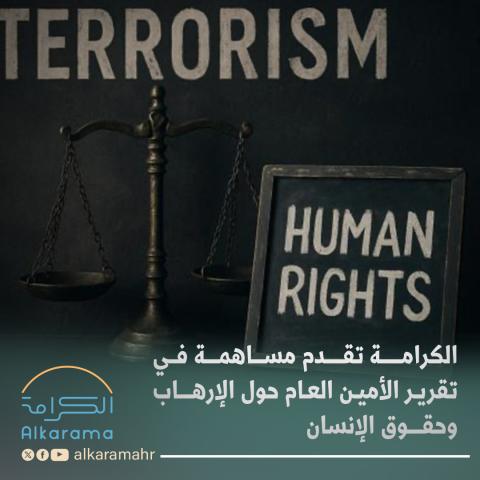
On 14 April 2025, Alkarama submitted its contribution to the United Nations Secretary-General in view of the preparation of his report on the implementation of resolution 78/210. This document, to be presented before the Human Rights Council and the General Assembly, forms part of a broader international initiative to document human rights violations committed under the pretext of counterterrorism — a process to which Alkarama seeks to make a substantive and constructive contribution.
Adopted by the General Assembly, resolution 78/210 calls on States to respect their international human rights obligations in the context of counterterrorism. It mandates the Secretary-General to assess the compliance of national laws and practices with international standards, relying in particular on contributions from civil society actors such as Alkarama.
In its report, Alkarama denounces the abuses of counter-terrorism legislation, particularly in the Arab world where it has operated since 2004.
These laws, often vaguely worded, are used to criminalise peaceful dissent and reinforce state repression. The report highlights emblematic cases such as Article 87 bis of the Algerian Penal Code, and "rehabilitation" centers in Saudi Arabia and the United Arab Emirates (UAE) which function as sites of extrajudicial detention.
The report also sheds light on insidious abuses linked to digital surveillance and control of financial flows, carried out in the name of national security. In countries such as Jordan, the UAE, and even France, these measures severely undermine the rights to privacy, freedom of expression, and freedom of association. The case of political scientist François Burgat — prosecuted for “glorification of terrorism” based on a decontextualised excerpt from one of his works — exemplifies the dangers of broadly defined legislation where the line between critical analysis and incitement to violence becomes dangerously blurred.
Regarding foreign fighters, Alkarama refers to Guantanamo as a lingering symbol of abuse: detention without trial, torture, and lack of legal recourse. Detainee transfers to certain Arab states, notably the UAE, take place without safeguards, exposing individuals to further violations and offering no prospects for reintegration.
Despite repeated calls from international organisations and civil society, many States continue to resist reforming their counterterrorism laws. This resistance, often justified by inflexible security discourse, reflects a political will to maintain emergency measures in times of peace under the pretext of combating terrorism.
Furthermore, National Human Rights Institutions (NHRIs), which are supposed to monitor and uphold fundamental rights, rarely fulfill their role. Often instrumentalised or stripped of meaningful power, they serve as institutional façades whose silence or inaction contributes to the normalisation of abuse.
In response to these findings, Alkarama calls for substantial legal reforms, the strengthening of civil checks and balances, and genuine international accountability. It advocates for a counter-terrorism strategy based on the rule of law, transparency, and respect for human rights.
